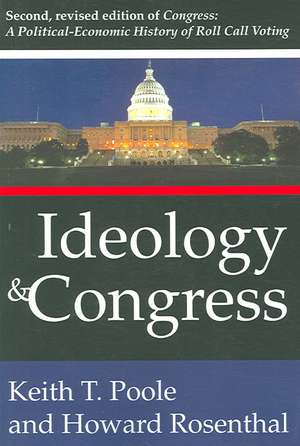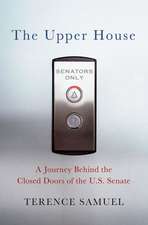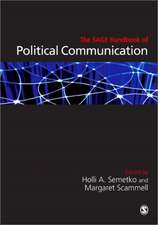Ideology and Congress: A Political Economic History of Roll Call Voting
Autor Keith T. Pooleen Limba Engleză Paperback – 15 dec 2006
| Toate formatele și edițiile | Preț | Express |
|---|---|---|
| Paperback (1) | 420.08 lei 43-57 zile | |
| Taylor & Francis – 15 dec 2006 | 420.08 lei 43-57 zile | |
| Hardback (1) | 1000.27 lei 43-57 zile | |
| Taylor & Francis – 6 oct 2017 | 1000.27 lei 43-57 zile |
Preț: 420.08 lei
Nou
Puncte Express: 630
Preț estimativ în valută:
80.38€ • 84.14$ • 66.90£
80.38€ • 84.14$ • 66.90£
Carte tipărită la comandă
Livrare economică 31 martie-14 aprilie
Preluare comenzi: 021 569.72.76
Specificații
ISBN-13: 9781412806084
ISBN-10: 1412806089
Pagini: 362
Dimensiuni: 152 x 229 x 25 mm
Greutate: 0.54 kg
Ediția:Revised
Editura: Taylor & Francis
Colecția Routledge
Locul publicării:Oxford, United Kingdom
ISBN-10: 1412806089
Pagini: 362
Dimensiuni: 152 x 229 x 25 mm
Greutate: 0.54 kg
Ediția:Revised
Editura: Taylor & Francis
Colecția Routledge
Locul publicării:Oxford, United Kingdom
Cuprins
Preface to Ideology and Congress, Preface to Congress: A Political-Economic History of Roll Call Voting (1997), 1. Introduction: The Liberal/Conservative Structure, 2. The Spatial Model and Congressional Voting, 3. The Spatial Model: Accuracy and Dimensionality, 4. The Spatial Model: Stability, Replacement, and Polarization, 5. Party Realignment in Congress, 6. Issues, Constituent Interests, and the Basic Space, 7. Sophisticated Voting and Agenda Manipulation, 8. Roll Call Voting and Interest Group Ratings, 9. Committees and Roll Calls, 10. Abstention from Roll Call Voting, 11. The NOMINATE Literature, 12. The Unidimensional Congress, References, Index
Descriere
In Ideology and Congress, authors Poole and Rosenthal have analyzed over 13 million individual roll call votes spanning the two centuries since Congress began recording votes in 1789










